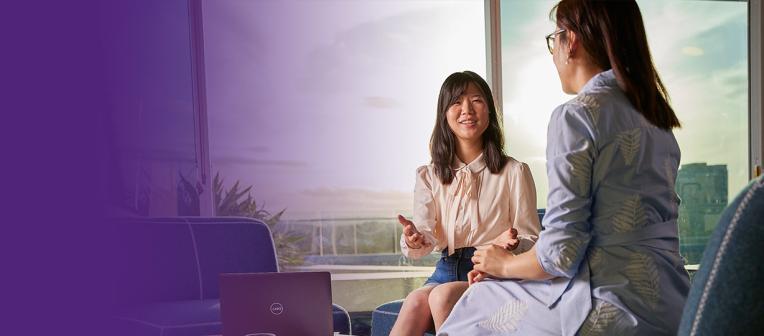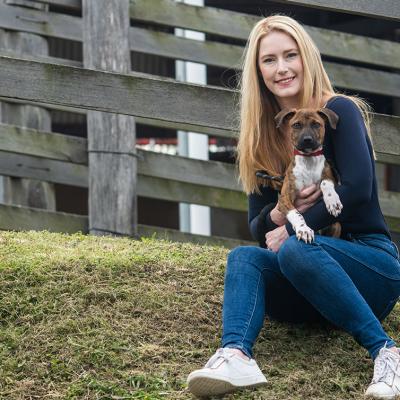Our actions can impact the economy in a multitude of ways every day, often without us even realising. In your own life, it could be something as small as buying a cup of coffee each morning or as big as acquiring a home mortgage.
Drawing on psychological, sociological and political theories, behavioural economics is a field of study that seeks to create realistic predictions of the economy by looking beyond what is considered rational human behaviour. Instead, the discipline examines the often-conflicting motivations behind decision making to forecast or influence the actions of individuals and institutions.
Dr Vera te Velde, a Senior Lecturer from The University of Queensland (UQ)’s School of Economics, believes understanding how humans really make decisions is useful for employers, organisations and governance.
“By paying attention to the individual decision-making process, we are slowly building a much richer picture of human economic behaviour,” she says.
Dr David Smerdon, also from the UQ School of Economics, says the consequences of irrational decisions can have a long-term impact on markets, returns and welfare.
Here, David explores 6 key behavioural economics principles and how you can apply them in real-life situations.
6 key behavioural economics concepts

1. Loss aversion
Loss aversion explains people’s tendency to place greater importance on losses over gains of equal value.
“It is a cognitive bias that can lead people to make irrational decisions,” says David.
“For example, a person might be more upset about losing $100 than they would be happy about gaining $100.”
“A study found that people were more likely to choose a health insurance policy that avoided a loss than one that offered a gain, even if the policies were economically equivalent.”
2. Framing effect
The framing effect occurs when you react differently to a particular choice depending on how it is presented to you. The value proposition changes if the choice is framed as positive or negative – when in reality, it has the exact same value.
“People are more likely to choose a product that is advertised as 90% fat-free than one that is advertised as 10% fat,” says David.
“A recent study found that people were more likely to choose a renewable energy plan when it was framed as a way to avoid losing money, as opposed to when it was framed as a way to save money.”
Study at the only Queensland institution to offer a Bachelor of Economics and learn more about behavioural economics. You can major in Economics of Strategy and Behaviour and take courses like Behavioural Economics and Experiments and Decision Making to build your knowledge.
3. Present bias
Present bias refers to the inclination to choose a smaller reward in the present instead of a larger reward in the future.
“During the COVID-19 pandemic, more than 2.6 million Australians withdrew up to $20,000 each from their superannuation fund without penalty under a Government scheme," says David.
"A 2023 study reported that each early withdrawal of $20,000 cost a person roughly $120,000 in future retirement income in today’s terms.”
“People who made the early withdrawals had present bias and were more likely to spend the funds on short-term consumption like entertainment and gambling, rather than on savings or investment.”
When both rewards presented are delayed by the same amount of time, it’s not uncommon for people to backtrack on their initial decision because there is no immediate payoff.
4. Status quo bias
Status quo bias explains how sometimes we may prefer things to stay the same. This can often result in someone sticking with a decision they’ve made before or simply doing nothing instead of taking action.
"A person exhibiting status quo bias might choose to keep their current health insurance policy despite a better policy being available,” says David.
“Similarly, an Australian study found that people were more likely to choose a default option for their superannuation plan, even if it was not the best option for them.”
Apply for a Master of Economics to upskill in behavioural economics and gain a unique skillset that will prepare you to make complex business decisions.
5. Social normalisation
Social normalisation looks at the way expectations in our social groups can influence changes in our behaviour, particularly in the way we consume and engage with products and services. Social groups can include our family, neighbours, friends, peers and colleagues. In some instances, social normalisation leads to both conformity and change when new norms are established and adopted by others in these groups.
“Social normalisation might simply be recycling more if you see your neighbours doing it,” says David.
“Several studies have found that people are more likely to install solar panels if they knew that their neighbours had them.”
6. Opportunity cost neglect
Opportunity cost neglect refers to the money you could have spent on a more valuable asset but chose not to. The concept looks at how we may ignore the opportunity cost of a decision that could accrue value over time.
“As an example, you might choose to spend money on a new car without considering the opportunity cost of not investing that money,” says David.
“When pursuing a particular career, people may overlook the opportunity costs of foregoing alternative paths. For example, someone might choose a high-paying job that requires working nights and weekends, without considering the value of the extra time afforded by a less stressful job that allows for more work-life balance.”
Find out more about UQ’s Behavioural and Economic Science Cluster (BESC), an interdisciplinary group of researchers in economics and behavioural sciences, and how they use insights from behavioural economics to explore financial, political, social and economic issues. As a postgraduate student, you can access the BESC Laboratory to conduct your own experimental research in social sciences such as economics, psychology, management and political science.
Understand the world better with behavioural economics

For those curious about economics, David advocates for keeping an open mind and having a willingness to challenge your assumptions.
“Economics is a fascinating field that can help you understand the world around you and make better decisions,” says David.
In particular, concepts taught in behavioural economics courses can help you analyse the seemingly chaotic behaviour of others. By better understanding anomalies in human decision making, you can create informed economic strategies with the potential to influence consumer behaviour and improve cognitive performance.
According to Vera, students of behavioural economics can look forward to a growing number of positions in both the public and private sector that explicitly demand behavioural economic expertise.
“Behavioural economics can be put to work to improve governance by reducing psychological barriers in bureaucratic procedures, for example to increase tax compliance or welfare program take-up rates," says Vera.
"Or, it can be put to use by companies that wish to improve their product appeal, marketing effectiveness, consumer relationships, or nearly any other area that involves consumers making choices.”
A bonus of understanding behavioural economics is getting a closer look at your own actions and using that insight to enact positive change.
“Behavioural economics can give you insights into how people make decisions and how you can also use that knowledge to improve your own decision-making.”
– Dr David Smerdon
Enjoyed reading about behavioural economics?
Learn more about behavioural economics from lecturers like Dr David Smerdon in our range of undergraduate and postgraduate economics programs.






